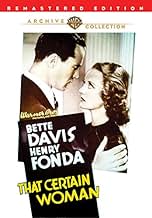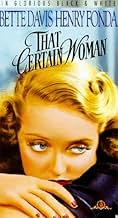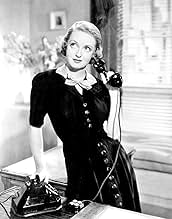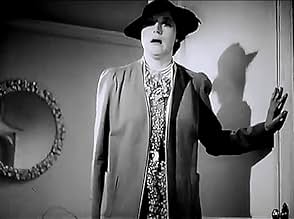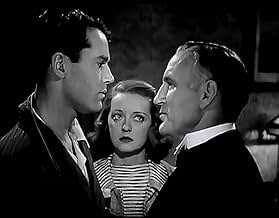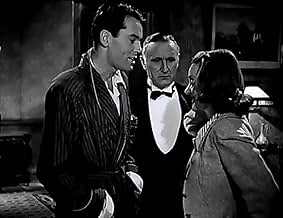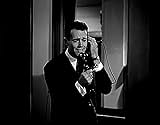VALUTAZIONE IMDb
6,4/10
1788
LA TUA VALUTAZIONE
Aggiungi una trama nella tua linguaMary Donnell, a young legal secretary with a past, elopes with a client's son, but his father has the marriage annulled without knowing she's pregnant.Mary Donnell, a young legal secretary with a past, elopes with a client's son, but his father has the marriage annulled without knowing she's pregnant.Mary Donnell, a young legal secretary with a past, elopes with a client's son, but his father has the marriage annulled without knowing she's pregnant.
- Regia
- Sceneggiatura
- Star
- Premi
- 1 vittoria in totale
Katharine Alexander
- Mrs. Rogers
- (as Katherine Alexander)
Mary Philips
- Amy
- (as Mary Phillips)
Richard DeNeut
- Boy
- (as Dickie DeNeut)
John Hamilton
- American
- (scene tagliate)
Edward Keane
- Opposing Counsel
- (scene tagliate)
Recensioni in evidenza
Audiences will groan at the character of Mary Donnell. Bette Davis is normally looking out for number one--and she's definitely her good old self in the first half of the movie. The widow of a gangster, Donnell has become a super-competent legal secretary for a respected attorney in a big firm. She fends off unwanted press attention and generally handles herself quite well as a tough single girl in the big city.
She becomes the mistress of her married boss at the law firm (although the Hays Office undoubtedly required the removal of any breath of sexual content here, it should be pretty obvious to all what is going on). In the second half of the movie, which focusses on Jack Merrick (Henry Fonda), whom Donnell has always loved, she achieves peaks of self-sacrifice that will send you staggering to the bathroom to throw up.
This is the sort of film that gives soap opera a bad name.
She becomes the mistress of her married boss at the law firm (although the Hays Office undoubtedly required the removal of any breath of sexual content here, it should be pretty obvious to all what is going on). In the second half of the movie, which focusses on Jack Merrick (Henry Fonda), whom Donnell has always loved, she achieves peaks of self-sacrifice that will send you staggering to the bathroom to throw up.
This is the sort of film that gives soap opera a bad name.
Here, Davis plays a secretary, Mary Donnell, with a past: she was once married to a mobster when she was very young. He is now dead but the press will not let her forget her past and move forward. Jack Merrick , Jr. (Henry Fonda) is in love with Mary. He marries her—promising to stand on his own feet rather than living off of his wealthy father, (Donald Crisp). But Jack's father first forbids the marriage then, after they get married, he has it annulled, and sweeps Jack off to Europe.
However, Mary has Jack's baby and names him Jackie. She is emotionally supported by her maid, Amy (Mary Philips)-who here plays a role something like Thelma Ritter would play in later movies. Mary is also supported by her understanding boss, Lloyd Rogers (Ian Hunter), who has an unhappy marriage and is not-so-secretly in love with Mary. But, his love is unrequited.
As the years pass and little Jackie grows, Mary remains in love with Jack: she can't get him out of her mind. Jack marries in Europe and he and his wife, 'Flip' (Anita Louise), are in a bad car accident that leaves her in a wheelchair for life. When Jack and Amy return to America, they both re-enter Mary's life: Jack is introduced to, and falls in love with, his 4-year-old son. 'Flip' makes a point of visiting Mary to ask her to marry Jack so that he can have a 'full life' with Mary and little Jackie.
This is one of those Bette Davis melodramas in which she is asked to make personal sacrifice(s), but the movie has too MANY of these moments. In fact until the end, we are left wondering who she will have to sacrifice: Jack?—Jackie?—both?-neither? The only 'villains' of this movie are Jack's father, who continually foils the love between Mary and Jack, and the tabloid newspaper reporters who won't leave Mary alone.
Surprisingly, the other women, of the movie (Mrs. Rogers, Flip, and even Amy)--who should resent Mary--are always way TOO understanding towards her. Not only does the movie suffer from an excess of these moments but the ending is WAY contrived too.
It's too bad, because the movie seemed to show some promise at the beginning. All this aside, Bette Davis' acting is still the great stuff that we have learned to expect from her.
However, Mary has Jack's baby and names him Jackie. She is emotionally supported by her maid, Amy (Mary Philips)-who here plays a role something like Thelma Ritter would play in later movies. Mary is also supported by her understanding boss, Lloyd Rogers (Ian Hunter), who has an unhappy marriage and is not-so-secretly in love with Mary. But, his love is unrequited.
As the years pass and little Jackie grows, Mary remains in love with Jack: she can't get him out of her mind. Jack marries in Europe and he and his wife, 'Flip' (Anita Louise), are in a bad car accident that leaves her in a wheelchair for life. When Jack and Amy return to America, they both re-enter Mary's life: Jack is introduced to, and falls in love with, his 4-year-old son. 'Flip' makes a point of visiting Mary to ask her to marry Jack so that he can have a 'full life' with Mary and little Jackie.
This is one of those Bette Davis melodramas in which she is asked to make personal sacrifice(s), but the movie has too MANY of these moments. In fact until the end, we are left wondering who she will have to sacrifice: Jack?—Jackie?—both?-neither? The only 'villains' of this movie are Jack's father, who continually foils the love between Mary and Jack, and the tabloid newspaper reporters who won't leave Mary alone.
Surprisingly, the other women, of the movie (Mrs. Rogers, Flip, and even Amy)--who should resent Mary--are always way TOO understanding towards her. Not only does the movie suffer from an excess of these moments but the ending is WAY contrived too.
It's too bad, because the movie seemed to show some promise at the beginning. All this aside, Bette Davis' acting is still the great stuff that we have learned to expect from her.
Mary Donnell (Bette Davis) has a checkered past as a gangster's young widow. Now, she's lawyer Lloyd Rogers' secretary. She falls for wealthy playboy client Jack Merrick (Henry Fonda) and they get a quickie marriage. His father disapproves of her.
It's a melodrama with star Bette Davis and future star Henry Fonda. Bette is able to keep the story moving with her superior acting. Fonda is a little miscast although this is very early in his career. He hasn't settled into his everyman genuineness. He's still a good romantic lead. He isn't able to bring out the flaws in his character. In the end, this is mostly about Bette and she makes this work.
It's a melodrama with star Bette Davis and future star Henry Fonda. Bette is able to keep the story moving with her superior acting. Fonda is a little miscast although this is very early in his career. He hasn't settled into his everyman genuineness. He's still a good romantic lead. He isn't able to bring out the flaws in his character. In the end, this is mostly about Bette and she makes this work.
Bette Davis is "That Certain Woman" in this 1937 remake of "The Trespasser." Davis is the widow of a mobster killed in the Saint Valentine's Day massacre. Now she works for a businessman Lloyd Rogers (Ian Hunter) and uses the name Mary Donnell. She has two men in love with her: her boss Lloyd and a man from a wealthy family, Jack Merrick (Henry Fonda). Knowing who she is thanks to a news story, Merrick's dad (Donald Crisp) is violently opposed to the marriage, but she and Jack marry. They break up right after the honeymoon, thanks to the dad, but during the honeymoon, Mary conceived Jack Jr. Jack goes off to Paris and marries Flip (Anita Louise), not knowing anything about the baby. Meanwhile, the unhappily married Lloyd is hanging around Mary.
Very melodramatic and dated film in the Stella Davis sacrifice vein, with both Davis and Fonda giving excellent performances. Fonda in those days was Jane Fonda with a man's haircut - the resemblance is there for all to see. He's adorable. Also as an actor, he was more energetic and earnest; later, he became more internalized, and in my opinion, less interesting. Davis sports an ugly hair-do (except when she's either just waking up or going to bed).
Very likable stars, and the story will keep you interested, even if it is dated.
Very melodramatic and dated film in the Stella Davis sacrifice vein, with both Davis and Fonda giving excellent performances. Fonda in those days was Jane Fonda with a man's haircut - the resemblance is there for all to see. He's adorable. Also as an actor, he was more energetic and earnest; later, he became more internalized, and in my opinion, less interesting. Davis sports an ugly hair-do (except when she's either just waking up or going to bed).
Very likable stars, and the story will keep you interested, even if it is dated.
This is a superior and under-rated "woman's picture" that really has all the elements of the classic weeper: star-crossed lovers, twists of fate, and self-sacrifice. It also has a sterling performance from Bette Davis which gives a strong indication of why she would soon be a superstar and regarded as the screen's best actress: Her belief in a character could suffuse it with passion and poignancy and transcend the shallowness of the accompanying story. She's supported by an excellent cast - Henry Fonda (in a basically thankless role), the ever-reliable Donald Crisp (her showdown scene with him oddly foreshadows similar scenes with Gladys Cooper in NOW, VOYAGER), Mary Phillips (in a role that in a later version would obviously have gone to Thelma Ritter), who was, at the time, Mrs. Humphrey Bogart (in the same year's MARKED WOMAN Davis would appear with Mayo Methot, the next Mrs. B., and Ian Hunter. Edmund Goulding, who excelled at this kind of thing, wrote and directed it - he would later direct Davis in two other notable soapers, DARK VICTORY (one of her most celebrated performances, as Judith Traherne), and THE GREAT LIE (for which Mary Astor won a Best Supporting Actress Oscar). It's all served up in the best Warner Bros. tradition, but doesn't seem to be as well-remembered as other such films of the era, such as MAGNIFICENT OBSESSION, STELLA DALLAS, or MY FOOLISH HEART.
Lo sapevi?
- QuizWith Bette Davis rising quickly through the ranks at Warner Brothers, she was able to choose her leading men, and for Vivo per il mio amore (1937) she chose Henry Fonda. Their lives had intersected a decade earlier when they worked in the same New England summer stock company. Even before that portion of their lives, they had met when Fonda gave the 17-year-old Davis a tour of Princeton University. One night, Fonda later wrote, while he and a friend took Davis and her sister out for a tour of the campus by moonlight, he nervously gave Davis an innocent kiss on the lips. A few days later he received a letter from her: "I've told mother about our lovely experience together in the moonlight. She will announce the engagement when we get home." Fonda was so naïve that he wasn't sure at first whether this was a joke! Davis remembered and liked Fonda enough to request him for this film and then again for Figlia del vento (1938).
- BlooperThe screen shows a newspaper page with headlines, photographs, and a box in large type, all part of a full-page gangster story. However, only some of the text that can be seen around the edges is part of the story. The rest is "dummy" type, about clothes for college men or electrical equipment.
- Citazioni
Lloyd Rogers: [to Mary] Money! I've got loads of it, and I'm one of the unhappiest men in the world!
- Curiosità sui creditiThe opening credits roll up.
- ConnessioniFeatured in Breakdowns of 1938 (1938)
- Colonne sonore'Cause My Baby Says It's So
(1937) (uncredited)
Music by Harry Warren
Played during the scene at the bar
I più visti
Accedi per valutare e creare un elenco di titoli salvati per ottenere consigli personalizzati
- How long is That Certain Woman?Powered by Alexa
Dettagli
- Data di uscita
- Paese di origine
- Lingua
- Celebre anche come
- That Certain Woman
- Luoghi delle riprese
- Azienda produttrice
- Vedi altri crediti dell’azienda su IMDbPro
- Tempo di esecuzione1 ora 33 minuti
- Colore
- Mix di suoni
- Proporzioni
- 1.37 : 1
Contribuisci a questa pagina
Suggerisci una modifica o aggiungi i contenuti mancanti

Divario superiore
By what name was Vivo per il mio amore (1937) officially released in India in English?
Rispondi

